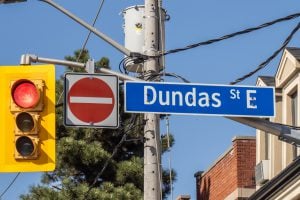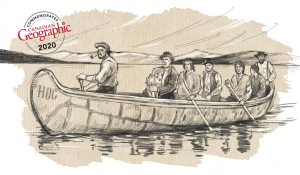
People & Culture
Renaming places: how Canada is reexamining the map
The history behind the Dundas name change and how Canadians are reckoning with place name changes across the country — from streets to provinces
- 4574 words
- 19 minutes
People & Culture

Ned Bell wants to change the way we think about seafood.
As the executive chef at Ocean Wise, a conservation program focused on making sustainable seafood more accessible, he knows that education and awareness are key to helping consumers make responsible decisions about what to put on their table.
That message will be central to Bell’s talk at the upcoming GeoGala in Vancouver, a fundraising event for The Royal Canadian Geographical Society for which he is also creating the food.
“I intentionally haven’t written the menu yet,” he says. “Sonia [Strobel] and I really want to celebrate what is available to eat that week. I want to make sure that we are taking the best of the ocean at that moment and celebrating species that the ecosystem is giving us.”
Strobel is the co-founder and CEO of Skipper Otto, a Vancouver-based, community-supported fishery aimed at connecting consumers directly with the people who catch their fish.
We spoke with Bell, a B.C. native, about what fuels his passion for sustainable cuisine.
On his roots
I think when you grow up on the west coast, you’re just inherently connected to the ecosystem. You recognize that the ocean is an incredibly important part of our life cycle. I was born on a farm in the Okanagan with parents who grew vegetables, and then we moved to Victoria, where I spent 10 years of my early life crunching crustaceans and whipping bull kelp at my brothers and sisters on the shores of Dallas Road. People are constantly talking about the southern resident killer whales or wild salmon or prawn season or halibut.
I also knew I wanted to be a chef at a very young age. I went to culinary school right out of high school. My first job was washing dishes at 14; I’ve always been in food. And, when you’re trained in Vancouver, you grow up with other chefs who are concerned about the ecosystem.
On the relationship between place and food
As somebody who’s ridden his bike across Canada to start a foundation called Chefs for Oceans, I’ve seen this incredible country firsthand. I recognize the places that we that we get to call home. I don’t know that we have a single identity as Canadians. I think our food is very regional, so whether you’re in Newfoundland or in P.E.I. or Ontario or here on the west coast, the food really changes. The cultures are so diverse and so different.
[The west coast is] the only place on the planet that has five unique species of wild Pacific salmon. It’s easily as iconic as Atlantic cod on the east coast. Dungeness crab, shellfish: clams, mussels, oysters, seaweed — we’re eating more of all of these here. The list goes on and on.
On redefining ‘sustainable’ seafood
I would actually not even call it sustainable; I would call it responsible seafood. Responsible seafood is two things: it’s fish that we harvest, and fish that we grow. For example, wild fish and farmed fish. There’s good wild and bad wild. If we take too much, or we damage the ecosystem as we’re taking it, that would be bad wild seafood. Here in Vancouver, we’ve been harvesting wild salmon for over 100 years aggressively. There’s only so much fish in the ocean. And yes, fish populations can regenerate and rebuild, but only if you allow Mother Nature the time to do that.
So the first thing is wild, well-managed fisheries, and then responsible aquaculture — the responsible farming of fish. That could be things like shellfish. Clams and oysters are filter feeders. You don’t even need to feed them — all you need to do is have a healthy ocean for them to thrive. They’re really Mother Nature’s perfect, sustainable seafood.
On consuming responsibly
The first step would be to just ask the question of your fishmonger or your chef or your server or your retailer: “Hey, is this seafood sustainable? Is this harvested responsibly? Is it grown responsibly?” If they can’t answer the question, then you are able to vote with your wallet and decide whether or not you’ll consume that seafood. For me, it starts with just asking the question because so many Canadians are not aware of where their seafood comes from.
On his favourite food
I went to pastry school first. I wanted to understand the beginning and the end of any great meal. I love a great dessert. I have a huge sweet tooth and have struggled my whole life with eating too much ice cream. I love a great lemon tart — those tangy, sweet, sour flavors. But at the end of the day, I would be hard-pressed to say there’s anything better than a freshly shucked oyster, where you’re drinking the ocean and eating Mother Nature’s real fast food.
Are you passionate about Canadian geography?
You can support Canadian Geographic in 3 ways:

People & Culture
The history behind the Dundas name change and how Canadians are reckoning with place name changes across the country — from streets to provinces

People & Culture
The story of how a critically endangered Indigenous language can be saved

History
A look back at the early years of the 350-year-old institution that once claimed a vast portion of the globe

People & Culture
The Food Network Canada judge discusses how he found his passion for food, the backstory of his restaurant Boulevard and the key to his continued success as one of the country’s top chefs